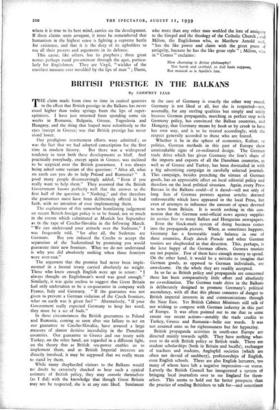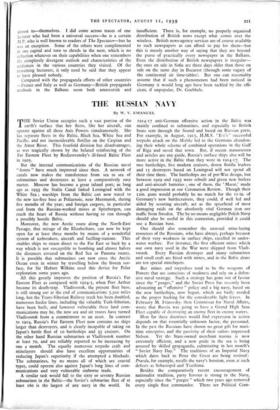BRITISH PRESTIGE IN THE BALKANS
By GODFREY LIAS
THE claim made from time to time in exalted quarters to the effect that British prestige in the Balkans has never stood higher than today springs from the lips of super- optimists. I have just returned from spending some six weeks in Rumania, Bulgaria, Greece, Yugoslavia and Hungary, and the thing that leaped most relentlessly to the eyes (except in Greece) was that British prestige has never stood lower.
Our prodigious rearmament efforts were admitted ; so was the fact that we had adopted conscription for the first time in modern history. But there was a widespread tendency to treat both these developments as bluff. And practically everybody, except again in Greece, was inclined to be sceptical over the British guarantees. I was always being asked some variant of this question: "After all, what on earth can you do to help Poland and Rumania?" A good many people disconcertingly added, "Even if you really want to help them." They assumed that the British Government knows perfectly well that the answer to the first half of the question is "Nothing," and that therefore the guarantees must have been deliberately offered in bad faith, with no intention of ever implementing them.
The explanation of this somewhat humiliating judgement on recent British foreign policy is to be found, not so much in the events which culminated at Munich last September as in the rape of Czecho-Slovakia in the following March. "We can understand your attitude over the Sudetens," I was frequently told, "for after all, the Sudetens are Germans. But you induced the Czechs to accept the separation of the Sudetenland by promising you would guarantee their new frontiers. What we do not understand is why you did absolutely nothing when those frontiers were over-run."
The argument that the promise had never been imple- mented in a formal treaty carried absolutely no weight. Those who knew enough English were apt to retort: "I always thought an Englishman's word was good enough." Similarly, it was quite useless to suggest that Great Britain had only undertaken to be a co-guarantor in company with France, Italy and Germany. "If the guarantee was not given to prevent a German violation of the Czech frontiers, what on earth was it given for?" Alternatively, "If your Government really expected Germany to keep her word, they must be a set of fools."
In these circumstances the British guarantees to Poland and Rumania, coming so soon after our failure to act on our guarantee to Czecho-Slovakia, have aroused a large measure of almost derisive incredulity in the Danubian countries. Our guarantee to Greece and our treaty with Turkey, on the other hand, are regarded in a different light, on the theory that as British sea-power enables us to implement them, and as British Imperial interests are directly involved, it may be supposed that we really mean to stand by them.
While many shepherded visitors to the Balkans would no doubt be extremely shocked to hear such a cynical estimate of British policy, they may console themselves (as I did) with the knowledge that though Great Britain may not be respected, she is at any rate liked. Sentiment in the case of Germany is exactly the other way round. Germany is not liked at all, but she is respected—not, assuredly, for any sterling qualities but simply and solely because German propaganda, marching in perfect step with Germany policy, has convinced the Balkan countries, and Hungary, that Germany means by hook or by crook to have her own way, and is to be treated accordingly, with the respect generally accorded to those who are feared.
Whether it be in the sphere of economics, Kultur, or politics, German methods in this part of Europe show unmistakable signs of co-ordinated design. The German trade drive which has given Germany the lion's share of the imports and exports of all the Danubian countries, as well as of Greece and Turkey, has been dovetailed in with a big advertising campaign in carefully selected journals. This campaign, besides preaching the virtues of German goods, has an appreciable effect on local editorial policy and therefore on the local political situation. Again, every Press Bureau in the Balkans could—if it dared—tell not only of long lists of German protests against articles deemed unfavourable which have appeared in the local Press, but even of attempts to influence the amount of space devoted to news from Britain. It is worth nothing in this con- nexion that the German semi-official news agency supplies its service free to many Balkan and Hungarian newspapers.
Even the block-mark system of doing business comes into the propaganda picture. When, as sometimes happens. Germany has a favourable trade balance in one of these countries, Kraft durch Freude and other German tourists are shepherded in that direction. This, perhaps, is the least happy of the German efforts. German tourists are not popular. Few of them have enough money to spend. On the other hand, it would be a mistake to imagine that German goods, as opposed to German individuals, are unwelcome. On the whole they are readily accepted.
In so far as British policy and propaganda are concerned there has been comparatively little effort and absolutely no co-ordination. The German trade drive in the Balkans is deliberately designed to promote Germany's political ascendancy, with all that this phrase connotes of danger to British imperial interests in and communications through the Near East. Yet British Cabinet Ministers still talk of not wishing to compete with German industry in this part of Europe. It was often pointed out to roe that to some extent our recent actions—notably the trade credits to Turkey, Greece and Rumania—belie our words. It was not counted unto us for righteotignecs but for hypocrisy.
British propaganda activities in south-east Europe are directed mainly towards uplift. They have nothing what- ever to do with British policy or British trade. There are student scholarships (both in Britain and locally), exchanges of teachers and students, Anglophll societies (which are often not devoid of snobbery), professorships of English, even English schools. There are also English lecturers, too many of whom have left a negative impression—or worse. Latterly the British Council has inaugurated a system of bringing local journalists over to see England for them- selves. This seems to hold out far better prospects than the practice of sending Britishers to talk for—and sometimes almost to—themselves. I did come across traces of one lecturer who had been a universal success—he is a certain M.P. who is well known to readers of The Spectator—but he was an exception. Some of the others were complimented in one capital and torn to shreds in the next, which is no reflection whatever on their capabilities when one remembers the completely divergent outlook and characteristics of the audiences in the various countries they visited. Of the remaining lecturers, it only need be said that they appear to have pleased nobody.
Compared with the propaganda efforts of other countries —France and Italy as well as Germany—British propaganda methods in the Balkans seem both amateurish and insufficient. There is, for example, no properly organised distribution of British news except what comes over the wireless. British news-agency services are of course available to such newspapers as can afford to pay for them—but this is merely another way of saying that they are beyond the purse of practically every newspaper in the Balkans. Even the distribution of British newspapers is irregular— the ones on sale in Sofia are three days older than those on sale on the same day in Bucarest (through some vagary of the continental air time-tables). But one can reasonably assume that if such a phenomenon had been noticed in Germany it would long ago have been tackled by the effi- cient, if unpopular, Dr. Goebbels.









































 Previous page
Previous page